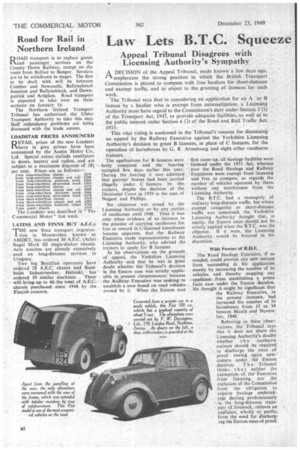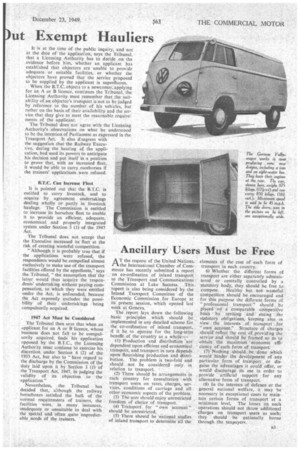Law Lets B.T.C. Squeeze ut Exempt Hauliers
Page 36

Page 37

If you've noticed an error in this article please click here to report it so we can fix it.
Appeal Tribunal Disagrees with Licensing Authority's Sympathy
A DECISION of the Appeal Tribunal, made known a few days ago, r-k emphasizes the strong position in which the British Transport Commission is placed,to compete with free hauliers for Short-distance and exempt traffic, and to object to the granting of licences for such work.
The Tribunal says that in considering an application for an A or B licence by a haulier who is exempt from nationalization, a Licensing Authority must have regard to the Commission's duty under Section 3 (1) of the Transport Act, 1947, to provide adequate facilities, as well as to the public interest under Section 6 (2) of the 'Road and Rail Traffic Act.' 1933.
• This vital ruling is contained in the Tribunal's reasons for dismissing an appeal by the Railway Executive against the Yorkshire Licensing Authority's decision to grant B licences, in place of C licences, for the operation of horseboxes by G. R. Armstrong and eight. other racehorse trainers.
The applications for B licences were hotly contested and the hearing occupied five days earlier this year. During the hearing it was admitted that patrons' horses had been carried . illegally under C licences by the trainers, despite the decision of the Divisional Court in 1939 in the case of Nugent and Phillips.
No objection was raised by the Licensing Authority or by any carrier of racehorses until 1948. Then it was only when evidence of an increase in the practice of carrying racehorses, for hire or reward in C-licensed horseboxes became apparent, that the Railway Executive made representations to the ,Licensing Authority, who advised the trainers to apply for B licences.
. In his observations on the grounds of appeal, the YorkShire Licensing Authority said that he was in great doubt whether the Tribunal's decision in the Enston case was strictly applicable in present circumstances, because the. RailwayExecutive was seekingto establish a case based on road vehicles owned by it. When the Enston case first came up, all haulage facilities were licensed under the 1933 Act, whereas now the Road Haulage and Railway Executives were exempt from licensing. and and free to compete, as regards the number of vehicles operated by them, without any interference from the Licensing Authority.
The B.T.C. had a monopoly of ordinary long-distance traffic, but where exempt categories or short-distance traffic was concerned, the Yorkshire Licensing Authority thought that, in equity. the Enston onus should not be strictly-applied when the B.T.C. was the objector. If it were, the Licensing Authority would be fettered in his discretion.
Wide Powers of R.H.E.
The Road Haulage Executive, if so minded, could prevent any new entrant from succeeding in his application. merely by increasing the number of its vehicles and thereby stopping any applicant. -from, establishing a prima facie case tinder the Enston decision. He thought it might be significant that
the Railway Executive, in the present instance, had increased the number, of its horseboxes from 15 to 19 beween March and November, 1948.
Referring to these obser vations, the Tribunal says that it does not share the Licensing Authority's doubts whether t he racehorse trainers should be required to discharge the onus of proof resting upon newcomers under the Enston decision. The Tribunal thinks that neither the exemption of the Executive from licensing, nor the exclusion of the Commission from the obligation to acquire haulage undertakings dealing predominantly in the long-distance transport ofliVestock, relieves an applicant, wholly or partly. front the need for discharging the Enston onus of proof.
It is at the time of the public inquiry, and not at the date of the application, says the Tribunal, that a Licensing Authority has to decide on the evidence before him, whether an applicant has established that objectors are unable to provide adequate or suitable facilities, or whether the objectors have proved that the service proposed to be supplied by the applicant is superfluous.
When the B.T.C. objects to a newcomer, applying for an A or B licence, continues the Tribunal, the Licensing Authority must remember that the suitability of an objector's transport is not to be judged by reference to the number of his vehicles, but rather on the basis of their availability, and the service that they give to meet the reasonable requirements of the applicant.
The Tribunal does not agree with the Licensing Authority's . observations on what he understood to be the intention of Parliament as expressed in the • Transport Act. It also disagrees with the suggestion that the Railway Executive, during the hearing of the application, had used its powers to anticipate his decision and put itself in a position to prove that, with an increased fleet, it would be able to carry racehorses if the trainers' applications were refused.
B.T.C. Can Increase Fleet It is pointed out that the B.T.C. is entitled to carry livestock, and to acquire by agreement undertakings dealing wholly or partly in livestock haulage. The Commission is entitled to increase its horsebox fleet to enable it to provide an efficient, adequate, economical and properly integrated system under Section 3 (1) ofthe 1947 Act.
The Tribunal does not accept that the Executive increased its fleet at the risk of creating wasteful competition.
"Although it is probably true that if the applications were refused, the respondents would be compelled almost exclusively to make use of the transport facilities offered by the appellants," says the Tribunal, "the assumption that the latter would thus acquire the respondents' undertaking without paying compensation, to which they were entitled under the Act, is unfounded, because the Act expressly excludes the possibility of their undertakings being compulsorily acquired.
1947 Act Must be Considered The Tribunal then says that when an applicant for an A or B licence, whose business does not fall to be compulsorily acquired, finds his application opposed by the B.T.C., the Licensing Authority must continue to exercise his discretion under Section 6 (2) of the 1933 Act, but also to "have regard to the discharge by the Commission of the duty laid upon it by Section 3 (1) of the Transport Act, 1947, in judging the validity of its objection to the application."
Nevertheless, the Tribunal • has decided that, although the railway horseboxes satisfied the bulk of the normal requirements of trainers, the facilities were. in many instances, inadequate. or unsuitable to deal with the 4)etial and often .quite unpredictable ,needs Of the trainers.




















































































